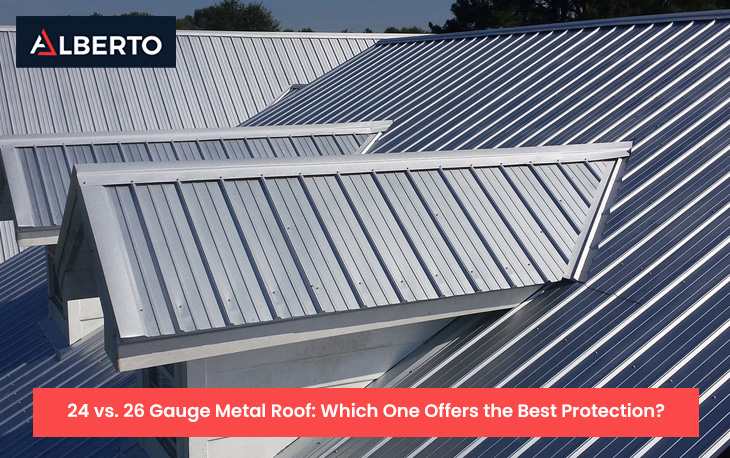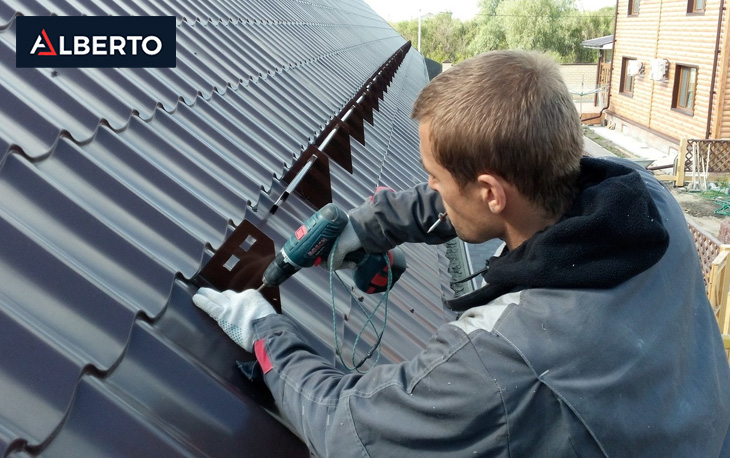24 vs. 26 Gauge Metal Roof: Which One Offers the Best Protection?
Metal roofs are very popular because they last a long time. However, choosing the right metal for your roof is important. Two common types are 24 gauge and 26 gauge. These numbers tell us how thick the metal is. Smaller numbers mean thicker metal. Therefore, 24 gauge is thicker than 26 gauge. This thickness affects how strong the roof is and how well it protects our homes. We must learn about these differences so we can pick the best roof for our needs.

Understanding Metal Gauge
Gauge measures the thickness of metal. A lower gauge number means thicker metal. For example, 24 gauge metal is thicker than 26 gauge metal. This difference in thickness impacts the metal’s strength and durability. Thicker metal is stronger and lasts longer. It can withstand more weight from snow or strong winds. On the other hand, thinner metal is lighter but may dent more easily. Thus, understanding gauge is important for choosing the right metal for your roof.
Consequently, 24 gauge metal is sturdier than 26 gauge. This extra thickness makes it more resistant to dents and damage from hail or falling branches. Additionally, it can handle heavier snow loads without bending or breaking. Therefore, 24 gauge is often used in areas with harsh weather.
Furthermore, 26 gauge metal is lighter and more flexible. This makes it easier to install. However, it is also more susceptible to damage from impacts. For this reason, it might be better suited for areas with milder weather.
Strength and Durability
The strength of a metal roof depends on its thickness. Thicker metal is stronger and more durable. As we know, 24 gauge metal is thicker than 26 gauge. So, 24 gauge roofs are stronger and last longer. They can withstand strong winds and heavy snow without getting damaged. Moreover, they are less likely to dent from hail or falling debris.
Similarly, 26 gauge metal roofs are still quite durable, but they are not as strong as 24 gauge roofs. They might bend or dent more easily in severe weather. For example, large hailstones could cause damage to a 26 gauge roof. Therefore, 24 gauge offers better protection in areas with extreme weather conditions.
In addition, the type of metal used also affects durability. Steel, aluminum, and copper are common roofing metals. Each metal has its own strengths and weaknesses. However, the gauge still plays a big role in how well the roof holds up over time.
Weather Resistance
Different weather conditions require different levels of protection. In areas with heavy snowfall, a strong roof is crucial. A 24 gauge metal roof can handle the weight of heavy snow much better than a 26 gauge roof. This is because the thicker metal is less likely to bend or collapse under the weight. Also, it resists damage from ice and freezing rain.
Likewise, in regions with strong winds, a thicker metal roof provides better protection. The wind is less likely to lift or tear off a 24 gauge roof compared to a 26 gauge one. Furthermore, 24 gauge metal resists damage from flying debris during storms.
Moreover, in areas with frequent hail storms, a 24 gauge roof provides better protection against dents and punctures. The thicker metal can withstand the impact of hailstones better than thinner metal. Thus, 24 gauge roofs offer superior weather resistance in most conditions.
Installation and Maintenance
Installing a metal roof requires skill and care. Both 24 and 26 gauge metal roofs need proper installation to perform well. However, 26 gauge metal is lighter and easier to handle. This can make installation a bit simpler. On the other hand, 24 gauge metal is heavier and requires more support.
Furthermore, both types of metal roofs require minimal maintenance. They do not rot, crack, or attract insects like some other roofing materials. However, it is important to inspect the roof regularly for any signs of damage. For instance, you should check for loose panels or damaged sealant.
In addition, proper ventilation is crucial for any metal roof. This helps to prevent condensation and moisture buildup, which can cause problems. Therefore, proper installation and maintenance are essential for the longevity of any metal roof.
Common Applications
24 gauge metal is often used in commercial buildings and areas with harsh weather. Its strength and durability make it a good choice for protecting large structures. Additionally, it is used in residential homes that need extra protection from severe weather.
Similarly, 26 gauge metal is commonly used in residential homes and smaller buildings. It provides good protection in areas with moderate weather conditions. Besides, it is a lighter and more cost-effective option than 24 gauge.
Therefore, the best choice depends on the specific needs of the building and the local climate. If you live in an area with extreme weather, 24 gauge is generally the better option. However, if you live in a milder climate, 26 gauge might be sufficient.

Comparison Table
| Feature | 24 Gauge Metal | 26 Gauge Metal |
| Thickness | Thicker | Thinner |
| Strength | Stronger | Less Strong |
| Durability | More Durable | Less Durable |
| Weather Resistance | Better | Good |
| Installation | More Challenging | Easier |
| Common Use | Harsh Weather, Commercial | Moderate Weather, Residential |


